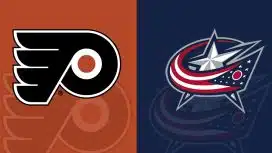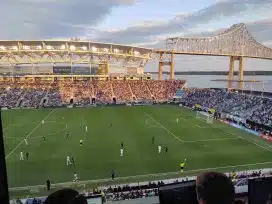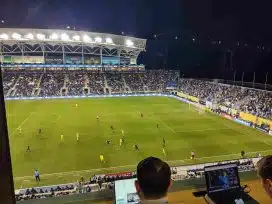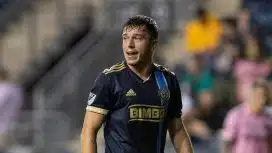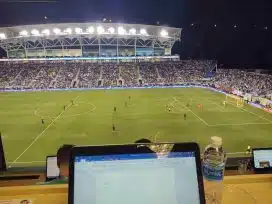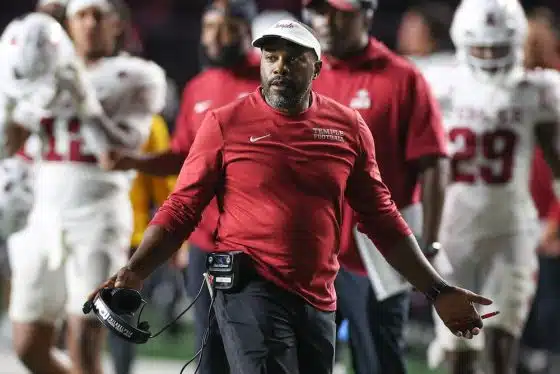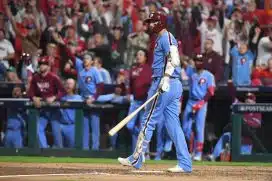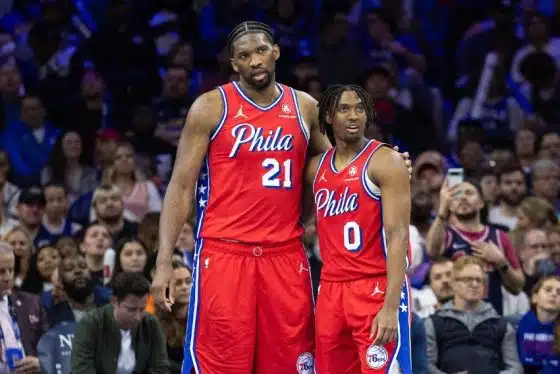Flyers
Analyzing the Flyers Hiring of Alain Vigneault
By Kevin Durso, Sports Talk Philly editor
The decision has been made. Alain Vigneault has been hired to be the next head coach of the Flyers.
The next few months will prove to be important when it comes to determining where the Flyers are as they begin the 2019-20 season. For now, the million dollar question — or five-year, $25 million question, the terms of Vigneault's contract — is if Alain Vigneault is the right fit for the Flyers.
The hiring was met with mixed reviews among Flyers fans, some seeing this as a sign that the team will take on more of a winning attitude and makeup and with changes try to restore the level of success that had become customary in the past. Others focused on Vigneault’s downfall in New York two years ago instead of the career body of work.
There are many factors that go into determining why the Flyers went this direction. Here are a few of them.
Experience
This one is obvious. The Flyers set their sights on Joel Quenneville months ago when the need for a new head coach came into play. The Flyers made a substantial offer, according to reports. Quenneville chose to go to Florida, to run a team constructed by Dale Tallon, a former GM and member of the Chicago front office when Quenneville was hired there. The Flyers also had reported interest in Dave Tippett. Tippett, however, is in the middle of serving as a consultant of sorts to the incoming expansion team in Seattle. They would have needed to pry him away.
When it comes to Vigneault, you can’t deny the resume. He’s coached for 16 seasons. He has 648 career wins, 12th all time in NHL history. He’s won the Jack Adams Award, reached the Stanley Cup Final twice. His teams have won the President’s Trophy three times, won seven division titles, reached 100 points or more eight times and made the playoffs 11 times.
In terms of being a veteran and having a track record for success, the only rival was Quenneville. With Coach Q in Florida, there was no doubt who the next best option was among the veterans.
It also helps that in each of his previous experiences as a head coach, Vigneault has been hired to turn a franchise around. In his first season in Montreal in 1997-98, the Canadiens made a 10-point improvement in the standings and reached the Eastern Conference semi-final. In his first season in Vancouver in 2006-07, the Canucks won the Pacific Division and reached the Western Conference semi-final. In his first season in New York in 2013-14, the Rangers finished second in the Metropolitan Division and reached the Stanley Cup Final.
The Flyers management group know this upcoming season is important in restoring interest. The players on the ice will ultimately determine that, but having a successful head coach who has done it multiple times in his career is a pretty good start.
His seven years in Vancouver really weren’t marred by any controversy or ultimate shortcomings. About the only thing Vigneault didn’t do in Vancouver was win Game 7 of the Stanley Cup Final to secure a championship. If the Flyers are getting that version of Vigneault, then they are certainly in good hands.
But it’s easy to focus on the Rangers tenure and think of the shortcomings there. Vigneault’s time in New York started just like Vancouver. His first season saw a Stanley Cup Final appearance. His second saw the team fall one game short of returning. The three years after that were a huge, well-documented fallout, from the cusp of contention to a full-on rebuild.
For many people who are of the “what have you done lately” mindset, Vigneault’s track record is defined by those three seasons.
It all comes down to which version of Vigneault the Flyers get. If they get the coach that nearly led two teams to the Stanley Cup, this will prove to be a solid hiring. If they get the same coach that so quickly fell from grace at the end of his time in New York, this process could be happening again soon enough.
Coaching Style
Vigneault has been described as a player’s coach, preaching communication in the locker room and letting the leadership group lead. Vigneault has a good personality and certainly has shown in the past that he can bring together a tight-knit group.
Vigneault’s coaching style and system are going to certainly be embraced by GM Chuck Fletcher. At his end of season media availability on April 8, Fletcher ran through a laundry list of bad habits the Flyers have.
“We have some bad habits right now,” Fletcher said. “Flying the zone before we have possession of the puck, not getting in shooting lanes, not keeping the third guy high, turning pucks over in the neutral zone when there’s no time and space to make a play, and just recognizing things. It’s mindset, but you need the mindset to embrace the habits.”
The mindset is critical in this decision. Vigneault may be a player’s coach, but he also holds the players accountable for bad habits. His system is one that focuses on the details of the game. Puck possession, quality breakouts, working hard in the dirty areas in battles on the wall.
There is no doubt that this style blended perfectly with what Fletcher was looking for when he made those comments a week before hiring Vigneault. From a fundamental standpoint, the Flyers were a mess last season, especially down the stretch. Their next head coach stresses the fundamentals and focuses on the details.
Playing the Young Guys
There was a lot made about Vigneault’s falling out with the Rangers in the final seasons of his five-year tenure and his love of playing veterans over younger, and possibly better, players. Names like Pavel Buchnevich come to mind.
Going back to his days in Vancouver, Vigneault never really had an issue with playing younger players. In his most successful season behind the bench, the 2010-11 season where the Canucks came up one win short of the Stanley Cup, Vancouver had a strong leadership group in its prime.
The Sedin twins were 30. Alexandre Burrows and Kevin Bieksa were 29. Dan Hamhuis was 28. The more veteran players included 36-year-old Sami Salo and 34-year-old Mikael Samuelsson. But the rising core was players like 26-year-old Ryan Kesler, 25-year-old Mason Raymond and 24-year-olds Jannik Hansen and Alexander Edler. Anchoring it all in goal was 31-year-old Roberto Luongo.
It’s a team that was built soundly, a blend of veteran players and younger players filling out depth roles. And while the Flyers roster isn’t built like that at the moment, it will be soon enough, whether that’s through the players already on the roster or additions to be made.
But the idea that Vigneault has it out for kids is overblown. He puts players in the lineup and into certain roles based on accountability, simple as that.
The Roster
Perhaps the most telling thing about the Vigneault hiring is what it means for the Flyers roster. Sure, there are a lot of pieces that seem like safe bets to be on the roster come September, but there are plenty of question marks too.
The Flyers have chosen a coach that has a very particular style, and it’s a style that is predicated on winning in the here and now. The Flyers current roster doesn’t seem to be in the same position. So how do you make this a fit? You shape the roster to the coach.
How the Flyers do that remains to be seen. Reading between the lines on a very basic level show that there are free agents that could be targets for the Flyers based on past history with Vigneault. Forwards Kevin Hayes, Derick Brassard and Carl Hagelin all played under Vigneault with the Rangers. Another name to consider is Flyers pending free agent goalie Cam Talbot, who also played under Vigneault with the Rangers.
One thing is certain with this decision: there are changes coming. The big question around that is to what extent will there be changes?













